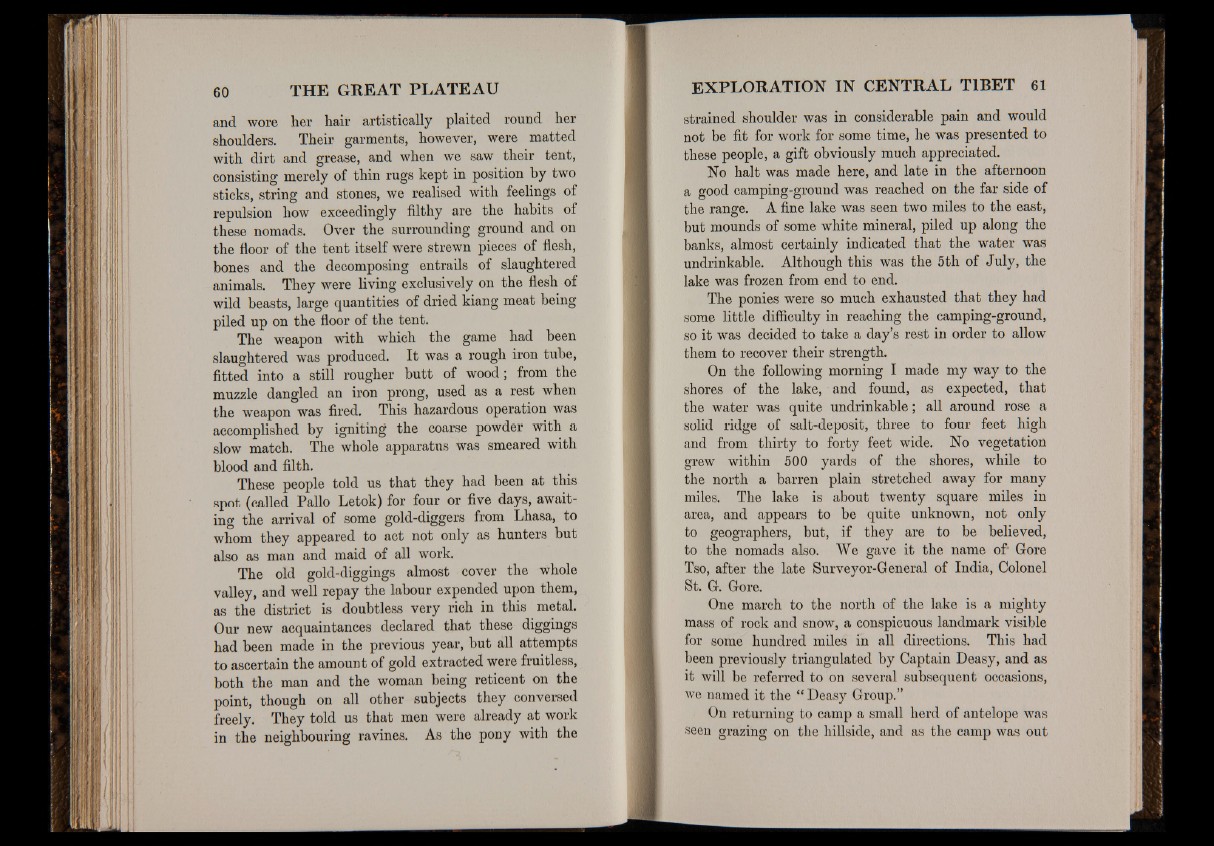
and wore her hair artistically plaited round her
shoulders. Their garments, however, were matted
with dirt and grease, and when we saw their tent,
consisting merely of thin rugs kept in position by two
sticks, string and stones, we realised with feelings of
repulsion how exceedingly filthy are the habits of
these nomads. Over the surrounding ground and on
the floor of the tent itself were strewn pieces of flesh,
bones and the decomposing entrails of slaughtered
animals. They were living exclusively on the flesh of
wild beasts, large quantities of dried kiang meat being
piled up on the floor of the tent.
The weapon with which the game had been
slaughtered was produced. It was a rough iron tube,
fitted into a still rougher butt of wood; from the
muzzle dangled an iron prong, used as a rest when
the weapon was fired. This hazardous operation was
accomplished by igniting the coarse powder with a
slow match. The whole apparatus was smeared with
blood and filth.
These people told us that they had been at this
spot (called Pallo Letok) for four or five days, awaiting
the arrival of some gold-diggers from Lhasa, to
whom they appeared to act not only as hunters but
also as man and maid of all work.
The old gold-diggings almost cover the whole
valley, and well repay the labour expended upon them,
as the district is doubtless very rich in this metal.
Our new acquaintances declared that these diggings
had been made in the previous year, but all attempts
to ascertain the amount of gold extracted were fruitless,
both the man and the woman being reticent on the
point, though on all other subjects they conversed
freely. They told us that men were already at work
in the neighbouring ravines. As the pony with the
strained shoulder was in considerable pain and would
not be fit for work for some time, he was presented to
these people, a gift obviously much appreciated.
No halt was made here, and late in the afternoon
a good camping-ground was reached on the far side of
the range. A fine lake was seen two miles to the east,
but mounds of some white mineral, piled up along the
banks, almost certainly indicated that the water was
undrinkable. Although this was the 5 th of July, the
lake was frozen from end to end.
The ponies were so much exhausted that they had
some little difficulty in reaching the camping-ground,
so it was decided to take a day’s rest in order to allow
them to recover their strength.
On the following morning I made my way to the
shores of the lake, and found, as expected, that
the water was quite undrinkable; all around rose a
solid ridge of salt-deposit, three to four feet high
and from thirty to forty feet wide. No vegetation
grew within 500 yards of the shores, while to
the north a barren plain stretched away for many
miles. The lake is about twenty square miles in
area, and appears to be quite unknown, not only
to geographers, but, if they are to be believed,
to the nomads also. We gave it the name of Gore
Tso, after the late Surveyor-General of India, Colonel
St. G. Gore.
One march to the north of the lake is a mighty
mass of rock and snow, a conspicuous landmark visible
for some hundred miles in all directions. This had
been previously triangulated by Captain Deasy, and as
it will be referred to on several subsequent occasions,
we named it the “ Deasy Group.”
On returning to camp a small herd of antelope was
seen grazing on the hillside, and as the camp was out